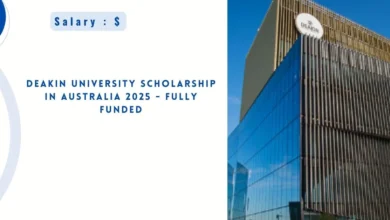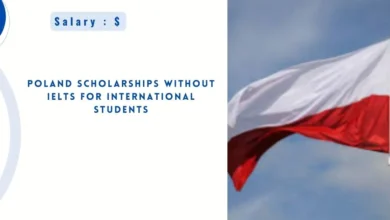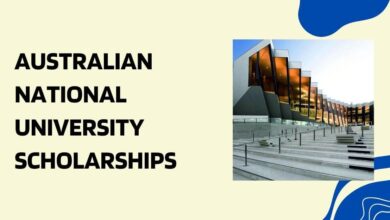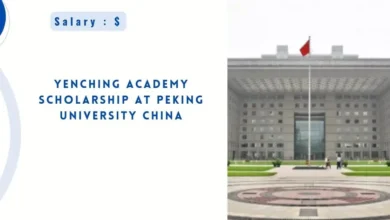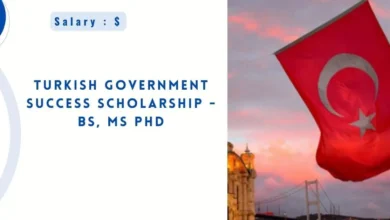KAIST University Graduate Scholarship 2025 – Spring Intake
This grant covers all expenses associated with studying in South Korea. You can apply for the KAIST University Graduate Scholarship for the Spring school year. International students can apply for the KAIST Graduate Scholarship to study for an MS, an MS that leads to a PhD, or a PhD.
Students come to KAIST from all over the world. The university is in South Korea, in the city of Daejeon. It is one of the best public colleges in the world. Here is more information about how to apply, what the scholarship covers, and what you need to do.
Check Also: Erasmus Mundus GLOBED Scholarships in Europe – Fully Funded
Key Points:
- University Name: KAIST
- Host Country: South Korea
- Who can Apply: For Masters, Ph.D.
- Financial Benefits: Fully Funded
Scholarship Benefits:
There are different kinds of scholarship opportunities at KAIST University. The KAIST Scholarship and (KGPS) help pay for all of KAIST’s graduate studies. At KAIST, the following types of awards are available:
- KAIST University Scholarship
- KAIST Global Presidential Scholarship (KGPS)
- GKS (Global Korea Scholarship)
Benefits of the KAIST University Scholarship:
- Total Tuition Fee Waiver for 4 semesters for people seeking a Master’s degree, 10 semesters for people seeking a combined Master’s and Ph.D. degree, and 8 semesters for people seeking a Ph.D. degree.
- Stipend Guaranteed Every Month: KRW 350,000 for Master’s programs and KRW 400,000 for Ph.D. programs
- Every month Premium for National Health Insurance
- Here in South Korea, a lot of students work part-time jobs for fun, to pass the time, or to make extra money.
Benefits of KAIST Global Presidential Scholarship (KGPS):
- Full Tuition Grant: 4 semesters
- Monthly Stipend Guarantee: KRW 1,000,000 for 4 semesters
Benefits of the GKS (Global Korea Scholarship):
- This is a grant program run by the Korean Government. It is no longer accepting college students.
- The GKS program pays for the student’s plane ticket, monthly living expenses, language lessons, and school. Click here to learn more about the GKS Korean Government Scholarship.
Degrees and Programs Offered:
- College of Natural Sciences
- Life Science and Bioengineering
- College of Engineering
- College of Liberal Arts and Convergence Science
- College of Business
Eligibility Criteria:
- International students who are not Korean citizens are the only ones who can apply.
- If you want to get into the Master’s program, you need to show proof that you have a bachelor’s degree.
- To get into the Ph.D. school, you need to show proof that you have a Master’s degree.
- More than 80% to 90% of the lessons are given in English.
- Grades Needed for English Language Proficiency:
- TOEFL iBT: 83
- IELTS: 6.5
- TOEIC: 720
- TEPS: 326
Request for English Proficiency Waiver:
If any of the following are true, you may be able to ask for an English Test proof waiver:
You don’t have to give an EPT score if you are from one of these countries or if you went to school in one of these countries.
- Barbados, Canada, Dominica, Grenada, Guyana, Ireland, Jamaica, Malta, New Zealand, St. Kitts, St. Lucia, St. Vincent, Trinidad and Tobago, the United Kingdom, and the United States…
If you are a member of one of the following countries and have a degree from one of these countries, you do not need to show an EPT score.
- Botswana, Cameroon, Eswatini, Ethiopia, Fiji, Gambia, Ghana, India, Jamaica, Kenya, Kiribati, Lesotho, Liberia, Malawi, Marshall Islands, Mauritius, Federated States of Micronesia, Namibia, Nauru, Nigeria, Pakistan, Palau, Papua New Guinea, Philippines, Rwanda, Samoa, Seychelles, Sierra Leone, Singapore, Solomon Islands, Republic of South Africa, Sudan, Republic of South Sudan, Tanzania, Tonga, Tuvalu, Uganda, Vanuatu, Zambia, Zimbabwe.
Required Documents:
All of the paperwork needs to be turned in in either Korean or English:
- This is a second copy of your national ID card.
- scanned copies of the ID cards for your parents.
- A certificate from the family registration office showing that you are related to your parents.
- Certificates for all degrees earned.
- If your degree isn’t finished yet, show a certificate or official letter that says when you plan to graduate.
- Your academic advisors should write two letters of reference for you.
- If the letters of reference come from your boss, you should also send a CV.
- Honors, awards, and proof of work.
Application Process:
To apply for the KAIST University Graduate Scholarship, please click on the provided link.
Conclusion:
The KAIST University Graduate Scholarship for Spring presents a remarkable opportunity for international students to pursue advanced degrees in South Korea. With full coverage of tuition, stipends, and health insurance, this fully funded scholarship supports those aiming for an MS, a combined MS and PhD, or a PhD. KAIST, located in Daejeon, South Korea, is renowned for its excellence in science and technology education.
Applicants must meet specific academic and English proficiency requirements, with potential waivers available for eligible candidates. Thorough preparation and adherence to application guidelines are crucial for those seeking to benefit from this prestigious scholarship.
Frequently Asked Questions:
What does the KAIST Graduate Scholarship cover?
The KAIST Graduate Scholarship covers full tuition fees, and living expenses, and offers additional allowances for research and travel. It is available for both Master’s and PhD programs.
How can I apply for the KAIST Graduate Scholarship?
Applicants must first apply for the relevant graduate program through the KAIST admissions portal. The scholarship is automatically considered for eligible students during the admission process.
What are the eligibility requirements for the KAIST Graduate Scholarship?
Eligibility requirements include a strong academic background, a relevant undergraduate degree (for Master’s applicants), or a completed Master’s degree (for PhD applicants). Proficiency in English or Korean is typically required, along with excellent academic performance.
